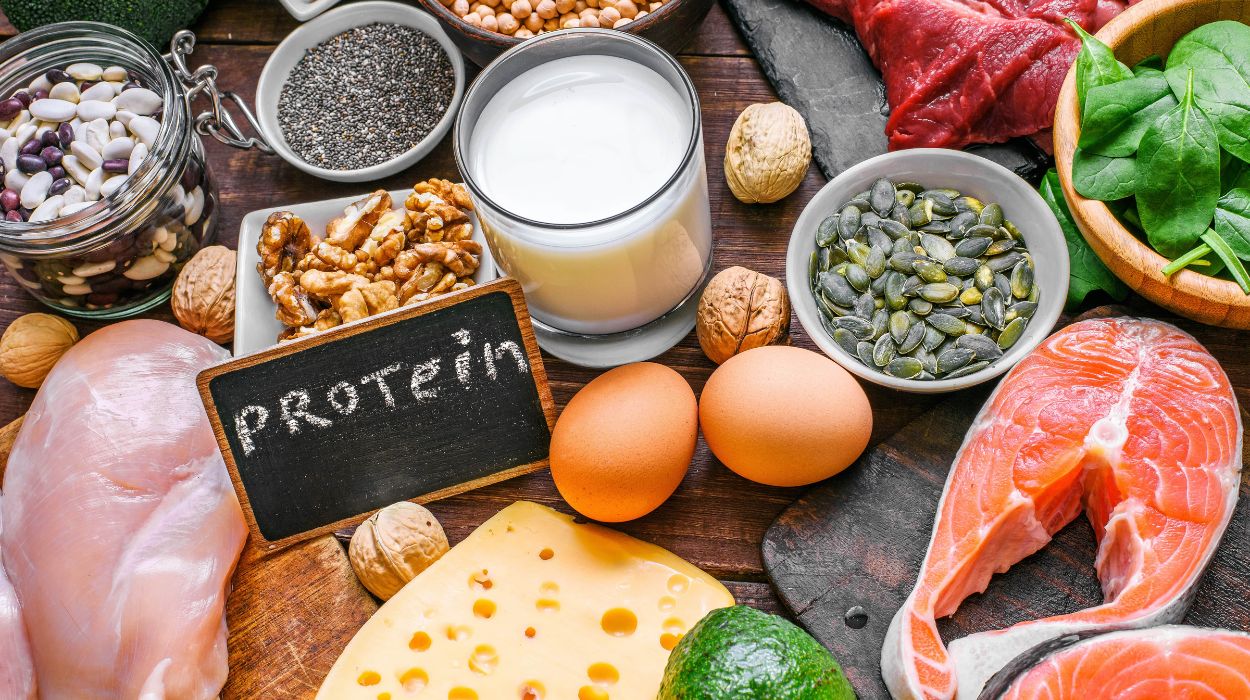 Expert's opinion
Expert's opinion
Expert's opinion
The article is a subjective view on this topic written by writers specializing in medical writing.
It may reflect on a personal journey surrounding struggles with an illness or medical condition, involve product comparisons, diet considerations, or other health-related opinions.
Although the view is entirely that of the writer, it is based on academic experiences and scientific research they have conducted; it is fact-checked by a team of degreed medical experts, and validated by sources attached to the article.
The numbers in parenthesis (1,2,3) will take you to clickable links to related scientific papers.
Foods That Cause Hair Loss You May Not Know In 2024

Does diet affect hair loss? We talk a lot about foods and products that can help hair growth, but did you know that some foods can be detrimental to your hair health and may be foods that cause hair loss? From processed foods to specific vitamins, what you eat can affect not only your health but the health of your hair, too.
Today we will give you a rundown on diet and hair loss in both females and males, discussing food that causes hair loss you may not know and what you should be eating instead to give your hair an optimal chance to shine.
Can Food Cause Hair Loss?
Yes, certain foods can cause hair loss. Among other things, diets that are predominantly made up of processed foods are thought to be inflammatory, such as those high in refined carbohydrates and unhealthy fats. These diets may contribute to systemic inflammation leading to hair loss[1] while potentially causing nutrient deficiencies in protein, iron, or other essentials, leading to nutrient deficiency-related hair issues.[2]
Excessive intake of sugars can disrupt the natural balance of hormones, leading to hair fall. Some studies have shown a link between an unbalanced diet with high sugar levels[3] and an increased risk of male-pattern baldness. A diet high in fat can cause premature hair follicle aging[4] due to pro-inflammatory signaling, leading to an increased risk of high-fat diet-induced hair fall.
But how do these and other food-related hair loss triggers all work? Great question; let’s get stuck into the nitty-gritty.
Foods That Cause Hair Loss

Excessive Saturated Fat And Cholesterol
Which foods cause hair loss? Foods high in cholesterol and saturated fat, like deep-fried snacks, red meat, and full-fat dairy, may increase inflammation in the body and reduce blood flow to the scalp when consumed in excess. This inflammation can affect the hair follicle and lead to hair loss.
Sugary Foods
Excessive consumption of sugary foods such as candy, cakes, other sweets, and even white bread is associated with increased inflammation in the body and an increased risk of hair loss.[3] Inflammation can damage the hair follicles and reduce blood flow, which prevents growth.
Processed Foods
Eating too many processed foods can impact your overall health, including your hair. Foods high in preservatives, such as canned goods, pre-packaged meals, and frozen dinners, are often stripped of essential nutrients needed for hair health.[5] A diet that includes predominantly processed foods can increase the risk of nutrient deficiencies that lead to hair loss.
Excessive Vitamin A
Excessive vitamin A can cause hair fall[6] by interfering with the production of an enzyme called 5-alpha reductase, which is necessary for producing sebum. This natural oil helps to keep the scalp healthy and promotes hair health. If not enough sebum is produced, it can lead to dryness, inflammation, and hair loss.
While it is hard to have excessive amounts of vitamin A from a balanced diet, it is something to keep an eye out for if you take supplements that contain a lot of it. The recommended daily intake of vitamin A[7] for an adult in the USA is 700 micrograms for a female and 900 micrograms for a male. Also, supplementation with selenium and vitamin E,[2] ironically contained in many hair therapeutic products, has been associated with hair loss.
Other Foods That Can Help Hair Growth
Luckily, certain dietary changes can be effective hair loss treatments, provided dietary choices cause hair loss. The first step would be to cut excessive consumption of the foods listed above and replace them with the following foods to keep your hair healthy:
Vitamin C

Vitamin C is a crucial nutrient in helping to promote hair growth.[8] It helps with the formation of collagen and plays a role in helping to absorb iron, which is used to create hemoglobin and red blood cells, both of which help deliver nutrients and oxygen to the scalp and hair follicles.
Foods that are high in vitamin C include citrus fruits such as lemons, limes, oranges, grapefruit, bell peppers, tomato, kiwi fruit, strawberries, broccoli, kale, Brussels sprouts, papaya, guava, cauliflower, and spinach.
Vitamin D
Vitamin D plays a significant role in helping to promote healthy hair growth.[9] A deficiency can lead to the premature onset of androgenic alopecia. By aiding the absorption of minerals, such as magnesium and calcium, vitamin D helps to keep hair follicles strong and nourished.
Vitamin D can be found in high-fat fish like salmon and tuna, egg yolks, fortified milk, yogurt, cheese, and orange juice. Some mushrooms are even exposed to ultraviolet light, so they produce their own natural Vitamin D. Sunlight is the gold standard of vitamin D intake, though, so spending time outdoors can help ensure your body gets enough of it.
Vitamin E
Vitamin E helps promote healthy hair growth[10] by protecting your strands against oxidative damage from environmental pollutants, radiation, smoke, and diet.
Vitamin E is present in a variety of foods, such as avocados, sunflower seeds, almonds, hazelnuts, and spinach. If you are supplementing with vitamin E, be sure to take it with some food containing fat to help it absorb. Also, as above, remember that too much vitamin E, like vitamin A, can be counterproductive to hair growth.
Iron
Iron aids in transporting oxygen throughout the body, providing energy for cells and promoting healthy hair growth.[11]
Iron is found in foods such as lean red meat, dark leafy greens, legumes, and fortified cereals. Certain vitamins, minerals, and herbs can work synergistically with iron to further support optimal hair health. This includes vitamin C, which helps with iron absorption.
Zinc
Zinc plays an important role in regulating hormones, including dihydrotestosterone.[12] It helps control the production and metabolism of DHT by modulating several proteins involved in the process. Particularly in male pattern hair loss, zinc can act as an inhibitor to 5-alpha reductase, an enzyme responsible for converting testosterone into DHT. Zinc may also reduce the activity of androgen receptors, which are responsible for binding with DHT and promoting its effects.
Zinc-rich foods include oysters, beef, pork, beans, nuts, whole grains, yogurt, and eggs. Other food sources of zinc include dark chocolate, spinach, mushrooms, pumpkin seeds, oatmeal, and quinoa.
Protein

Protein and amino acids are essential for hair growth,[2] as they provide the building blocks for healthy hair. Protein helps to strengthen and nourish the strands, to prevent breakage, and promote longer hair.
Foods that are rich in protein include lean meats such as beef, chicken, and fish; eggs and dairy products like cheese, yogurt, and milk; beans, nuts, and seeds; and soy products such as tofu.
Omega-3 Healthy Fats
Omega-3 fatty acids may help with hair growth in several ways.[13] These essential fatty acids are necessary for proper cell membrane function, as they comprise a significant portion of the cells’ structure.
The cell membrane regulates the flow of nutrients and oxygen into the hair follicles, aiding in the overall health and structure of individual strands. Omega-3 fatty acids can also help to reduce inflammation which is associated with many scalp issues that can lead to hair thinning.
Omega-3 fatty acids are found in foods such as salmon, tuna, sardines, chia seeds, walnuts, and flaxseeds, along with their oils.
Collagen
Collagen is an important structural element of hair, hence it being advertised as an important supplement to take for healthy hair. Collagen can be consumed in a diet that includes fatty fish and shellfish, but omega-3 itself is not collagen.
However, while some studies have demonstrated collagen supplementation may improve elasticity and hydration, the claims made by supplement products have not yet been proven[14] in the medical literature.
The Bottom Line
While there is not a huge body of research available on what foods cause hair loss, a common theme in what has been studied keeps circling back to inflammation.
Inflammatory diets can have a detrimental effect on not just overall health but hair health as well. High-sugar and processed foods can cause inflammation in the body that increases the likelihood of developing certain forms of alopecia.
A diet high in unhealthy fats, such as those found in fried foods, can also lead to inflammation. Plus, these foods may reduce the intake of essential nutrients found in a more balanced diet that are important for hair growth.
To promote hair growth and prevent hair fall and thinning due to inflammation, it is important to eat plenty of superfoods for hair, such as lean proteins such as fish or chicken, complex carbohydrates like whole grains and legumes, nuts and seeds rich in essential fatty acids, and plenty of fluids such as water or herbal tea throughout the day.
+ 14 sources
Health Canal avoids using tertiary references. We have strict sourcing guidelines and rely on peer-reviewed studies, academic researches from medical associations and institutions. To ensure the accuracy of articles in Health Canal, you can read more about the editorial process here
- Gokce, N., Basgoz, N., Kenanoglu, S., Akalin, H., Ozkul, Y., Ergoren, M.C., Beccari, T., Bertelli, M. and Dundar, M. (2022). An overview of the genetic aspects of hair loss and its connection with nutrition. Journal of preventive medicine and hygiene, [online] 63(2 Suppl 3), pp.E228–E238. doi:https://doi.org/10.15167/2421-4248/jpmh2022.63.2S3.2765.
- Guo, E.L. and Katta, R. (2017). Diet and hair loss: effects of nutrient deficiency and supplement use. Dermatology Practical & Conceptual, [online] pp.1–10. doi:https://doi.org/10.5826/dpc.0701a01.
- Shi, X., Tuan, H., Na, X., Yang, H., Yang, Y., Zhang, Y., Xi, M., Tan, Y., Yang, C., Zhang, J. and Zhao, A. (2023). The Association between Sugar-Sweetened Beverages and Male Pattern Hair Loss in Young Men. Nutrients, [online] 15(1), p.214. doi:https://doi.org/10.3390/nu15010214.
- Morinaga, H., Mohri, Y., Grachtchouk, M., Asakawa, K., Matsumura, H., Oshima, M., Takayama, N., Kato, T., Nishimori, Y., Sorimachi, Y., Takubo, K., Suganami, T., Iwama, A., Iwakura, Y., Dlugosz, A.A. and Nishimura, E.K. (2021). Obesity accelerates hair thinning by stem cell-centric converging mechanisms. Nature, [online] 595(7866), pp.266–271. doi:https://doi.org/10.1038/s41586-021-03624-x.
- Martini, D., Godos, J., Bonaccio, M., Vitaglione, P. and Grosso, G. (2021). Ultra-Processed Foods and Nutritional Dietary Profile: A Meta-Analysis of Nationally Representative Samples. Nutrients, [online] 13(10), p.3390. doi:https://doi.org/10.3390/nu13103390.
- VanBuren, C.A. and Everts, H.B. (2022). Vitamin A in Skin and Hair: An Update. Nutrients, [online] 14(14), p.2952. doi:https://doi.org/10.3390/nu14142952.
- Nih.gov. (2017). Office of Dietary Supplements – Vitamin A and Carotenoids. [online] Available at: https://ods.od.nih.gov/factsheets/VitaminA-HealthProfessional/.
- Almohanna, H.M., Ahmed, A.A., Tsatalis, J.P. and Tosti, A. (2018). The Role of Vitamins and Minerals in Hair Loss: A Review. Dermatology and Therapy, [online] 9(1), pp.51–70. doi:https://doi.org/10.1007/s13555-018-0278-6.
- Zubair, Z., Kantamaneni, K., Jalla, K., Renzu, M., Jena, R., Jain, R., Muralidharan, S., Yanamala, V.L. and Alfonso, M. (2021). Prevalence of Low Serum Vitamin D Levels in Patients Presenting With Androgenetic Alopecia: A Review. Cureus. [online] doi:https://doi.org/10.7759/cureus.20431.
- Hu, L., Kimura, S., Haga, M., Kashiwagi, S., Takagi, K., Shimizu, T., Ishii, T. and Ohyama, M. (2022). Vitamins and their derivatives synergistically promote hair shaft elongation ex vivo via PlGF/VEGFR-1 signalling activation. Journal of Dermatological Science, [online] 108(1), pp.2–11. doi:https://doi.org/10.1016/j.jdermsci.2022.09.003.
- Treister-Goltzman, Y., Yarza, S. and Peleg, R. (2021). Iron Deficiency and Nonscarring Alopecia in Women: Systematic Review and Meta-Analysis. Skin Appendage Disorders, [online] 8(2), pp.83–92. doi:https://doi.org/10.1159/000519952.
- Kondrakhina, I.N., Verbenko, D.A., Zatevalov, A.M., Gatiatulina, E.R., Nikonorov, A.A., Deryabin, D.G. and Kubanov, A.A. (2020). Plasma Zinc Levels in Males with Androgenetic Alopecia as Possible Predictors of the Subsequent Conservative Therapy’s Effectiveness. Diagnostics, [online] 10(5), p.336. doi:https://doi.org/10.3390/diagnostics10050336.
- Kang, J.-I., Yoon, H.-S., Kim, S., Park, J., Hyun, Y., Ko, A., Ahn, Y.-S., Koh, Y., Hyun, J., Yoo, E.-S. and Kang, H.-K. (2018). Mackerel-Derived Fermented Fish Oil Promotes Hair Growth by Anagen-Stimulating Pathways. International Journal of Molecular Sciences, [online] 19(9), p.2770. doi:https://doi.org/10.3390/ijms19092770.
- Rustad, A.M., Nickles, M.A., McKenney, J.E., Bilimoria, S.N. and Lio, P.A. (2021). Myths and media in oral collagen supplementation for the skin, nails, and hair: A review. Journal of Cosmetic Dermatology, [online] 21(2), pp.438–443. doi:https://doi.org/10.1111/jocd.14567.



